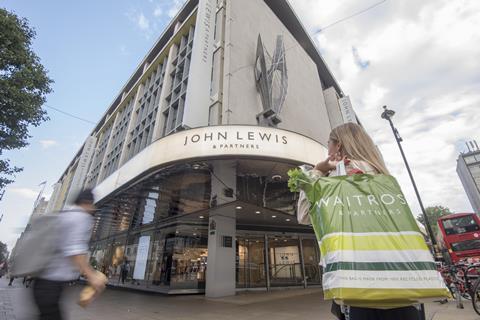
Top story
The John Lewis Partnership has cut its first-half losses by more than 40%, but extended the timescale of the completion of its turnaround plan by two years amid inflationary pressures and higher than expected investment requirements.
Posting its results for the six months to 29 July, JLP saw its first half pre-tax loss fall to £56.2m compared with £99.2m in the prior year, a 43% improvement.
The first-half loss before tax, partnership bonus and exceptional items was £54.5m, 18% better than the £66.8m loss in the first half of 2022/23 as the group incurred a number of exceptional costs last year.
Total group sales were £5.8bn in the half, up 2% year on year, with Waitrose up 4% and John Lewis down 2%. Total group revenues were up 3%, with Waitrose up 5% and John Lewis down 3%.
Waitrose sales were up 4% to £3.7bn, with growth growth was driven by average item price up 9%, with volumes down 5%.
As the half progressed the supermarket saw improving volume trends, with good momentum going into the second half.
Some £100m is being invested in price cuts to ease cost of living pressures on our customers: the ‘new lower prices’ campaign drove product sales growth of 12% and volumes up 13% year on year.
Waitrose said it is responding to the slow down in dining out with ten new ‘dining in’ deals, leading to a tripling in sales. The new £5 lunchtime meal deal has started strongly in its first week with ‘food to go’ sales up 34% year on year.
John Lewis sales were £2.1bn, down 2%. Customers continued to spend on themselves: fashion was up 3% and beauty was up 2% – partly driven by 50 new brands including JoJo Maman Bébé and Le Specs.
However, customers were more cautious about ‘big ticket’ items in home and tech (down 5% and 4% respectively). Interest bearing credit is now available online and will be available in store from mid-October, ahead of peak, to help customers spread the cost.
Profit-wise, Waitrose’s trading operating profit was up 17% to £504.4m, while John Lewis was down 6% to £277.1m.
Overall the Partnership said it was hit hard by inflation, which was at its highest since 1980, increasing its costs by £179m.
A combination of these inflationary pressures and greater than expected investment requirements for its transformation means it will take a further two years to deliver the Partnership Plan – to 2027/28 rather than to 2025/26.
This plan has been significantly adapted to give greater weight to productivity and efficiency under its ‘lean simple fast’ programme and the plan will now achieve an additional £600m of efficiencies over its life (with £308m already achieved through to March this year).
So far £31.2m has been realised in the first half through a combination of process simplification, margin efficiencies and supplier negotiations.
JLP said plans were on track to scale efficiencies in the second half, delivering over £100m benefit by the end of the year.
Overall the group expects an improved full-year performance compared with its £68.9m pre-tax loss last year.
While the economic outlook and consumer sentiment remain uncertain, it expects improved performance on the back of stronger Waitrose trading and further efficiency savings in the second half.
Its priorities for investment remain to modernise the business, improve customer service and do more for partner pay, where it is able. It stressed that these demands are significant and will take precedence over the Partnership bonus.
Sharon White, chairman, said: “The Partnership is a unique model that has been tested and come through stronger many times in our 100-year history. While change is never easy – and there is a long road ahead – there are reasons for optimism. Performance is improving. More customers are shopping with us. Trust in the brands and support for the Partnership model remain high.”
CEO Nish Kankiwala added: “Our transformation to modernise our business is well underway, and I want to thank our Partners for their efforts to give customers great service, quality and value when they shop with us in store or online. There are no brands better placed than Waitrose and John Lewis to provide customers with what they need right now – to help them feel good and eat well.”
Morning update
Discount retailer Lidl fell to a £76m loss in Great Britain last year as it invested in price and store openings to gain market share.
Lidl GB’s accounts for the 52 weeks ending 28th February 2023 showed it fell to a loss before tax of £75.9m compared with a profit of £41.1m in the prior year.
This was despite an 18.8% hike in revenues up to £9.3bn and reflected significant investment in prices, staff pay, suppliers and future growth.
Earnings before interest and tax fell to £28.5m from £79m in the prior period.
Lidl said the figures that show the scale of the investments it made during its last financial year, as it “held firm on its promise of providing its customers with the highest quality products at the lowest prices”.
This investment saw it attract an additional 1.4 million shoppers and its market share increase from 6.1% to 7.1%.
It also maintained its position as the UK’s highest-paying supermarket by investing £50m in increasing the minimum hourly rates for store colleagues twice during the period.
Meanwhile, the discounter opened almost 50 new stores, whilst securing multiple new sites for future expansion as it continued to publish its site requirements.
Ryan McDonnell, Lidl GB CEO: “We’ve always had a clear commitment to offer the best value to our customers and that is a promise we will always keep, even in uncertain economic times. Alongside preserving this price promise, rewarding our people and maintaining long-term relationships with our suppliers will always be a priority.
“As a privately-owned business we have the ability to make decisions that we know will have immediate benefits for our people, customers and suppliers and long-term benefits for our business.”
“The entire retail market has seen inflation, and we are no exception. However, for us, what is important is that our price gap to the traditional supermarkets is as strong as it has ever been. We’ve invested in keeping our prices low for customers in what has been a very challenging year for most and, with many more customers flooding through our doors each day, our ambition is to ensure that every single household has access to high-quality, affordable food at their local Lidl store.”
He added: “As a company, we’re entering an exciting new phase of growth where we are bolstering our infrastructure to sustain us for the long term and hiring thousands of new colleagues too.
“Next year will mark 30 years of Lidl in Great Britain, and there is no ceiling on our ambitions for the next 30 as we see the potential for hundreds of new stores across Great Britain. In many ways our brand has never been more relevant. We are, and will continue to be, a discount retailer maintaining a relentless focus on providing our customers with great quality at unbeatable prices.”
Elsewhere this morning, THG has posted a near £100m first half operating loss as sales slowed down as it disposed of non-core businesses.
Group revenues for the six months to 30 June were down 9.3% to £969.3m, driven by the strategic exit of non-core divisions and discontinued categories as well as short-term volume reductions within THG Beauty Manufacturing.
Total sales in the UK were broadly in line with the first half of the year 2022 for THG Beauty and THG Nutrition combined (excluding manufacturing).
THG Beauty suffered from the impact of industry-wide de-stocking, impacting both revenue and profitability given its fixed cost base (a –£9.5m EBITDA impact).
Excluding THG Beauty manufacturing, adjusted EBITDA margin improvement was 60bps relative to the prior year. As the group enters the third quarter, cost saving initiatives predominantly within manufacturing implemented in the first-half are supporting profitability improvements, the group said.
Its THG Nutrition business saw margins improve by 560bps to 13.8% following the unwind of a period of unusually high whey commodity prices.
THG Ingenuity saw revenues and adjusted EBITDA drop by 14.9% and 80bps respectively due to planned shift away from lower-value clients, reduction in volumes from internal clients and upfront investment in enterprise strategy.
The group’s operating loss expanded to £99.5m from £89.2m following management action to dispose of non-core assets and loss-making discontinued categories, which incurred a £26.2m one-off charge.
However, reported group adjusted EBITDA increased to £47.1m from £32.3m as losses from discontinued categories reduced from £8.5m to £3.1m following the execution of its strategic review to focus on a simpler, more profitable business.
Matthew Moulding, CEO of THG, said: “Inflationary pressures provided significant challenges to consumers and businesses alike over the past 18 months. Our strategy of supporting our consumers through 2022, sacrificing margins in the short-term, is bearing fruit.
“Our Nutrition division delivered a record H1 revenue performance and, with inflationary pressures easing, posted substantially higher EBITDA margins year-on-year as we exited H1. The early results from the Myprotein rebrand are also encouraging as we’ve taken steps to further enhance the premium nature of the world’s No1 online sports nutrition brand.
“Recent progress within our Beauty division has been more encouraging, underpinned by strong performances in the Group’s Perricone MD and ESPA brands, as well as across Cult Beauty. Margin improvements have steadily built through H1, as focus shifted to orders that deliver immediate profitability, where we benefit from the economies of scale associated with our local distribution hubs.
“Finally, Ingenuity’s pivot to larger, more complex Enterprise clients is gaining momentum, reflected in some key client wins and a strong pipeline. We were thrilled to be listed in the Gartner’s Magic Quadrant for Digital Commerce, in recognition of our ability to provide an all-encompassing direct-to-consumer journey, cementing Ingenuity as a key partner for Enterprise clients seeking comprehensive commerce excellence.”
Finally, Hilton Food Group has signed a long-term supply agreement with Walmart Canada.
Hilton Foods will open a new manufacturing facility in eastern Canada to supply Walmart’s Supercentres with a range of protein products, starting with beef, lamb, pork, seafood and moving into some added-value products. The new Hilton Foods facility will provide robotised store order picking into Walmart’s distribution centres.
It is proposed that Hilton Foods’ newly formed subsidiary, Hilton Foods Canada, will finance the new food packing facilities, with commencement of production targeted for 2026. Hilton Foods intends to lease the production facility and its investment in plant and equipment will be debt funded with principal expenditure commencing in 2024 and continuing throughout 2025. The Group’s leverage is expected to remain at “comfortable” levels during this investment phase.
Steve Murrells, Hilton Foods CEO, said: “We are delighted to be partnering with Walmart. This agreement further extends our global footprint and will be our first manufacturing facility in North America. It is another sign of the strength of our customer offer, as well as growing consumer demand for high quality, affordable, protein products, which we can deliver through our scale, international experience, and supply chain expertise. Hilton Foods and Walmart share the same high standards of sustainability and we are looking forward to providing Walmart with the service and range of quality products for which Hilton Foods is known.”
Sam Wankowski, chief merchandising officer, Walmart Canada, added: “With our customers top of mind, we’re sparking change in the way Walmart Canada sources proteins in Canada. Our new agreement with Hilton Foods – their very first in Canada – is a win for our customers. We’re strengthening our delivery of quality products at low prices and with more sustainable packaging to Canadians, while still continuing to support Canadian farms and ranches.”
On the markets this morning, the FTSE 100 is up 0.4% to 7,551.4pts.
Hilton Food Group is up 7% on its expansion in Canada to 776.8p.
Other risers include Deliveroo, up 6.8% to 123.6p, Nichols, up 3.9% to 1,080p and Hotel Chocolat, up 1.3% to 116p.
Fallers include THG, down 14.6% to 74.8p, Bakkavor, down 4% to 95.8p and Greencore, down 2.6% to 77.3p.
Yesterday in the City
The FTSE 100 was flat yesterday at 7,526pts.
The day’s risers included DS Smith, up 2% to 290.4p, Just Eat Takeaway.com, up 1.5% to 1,099p, Compass Group, up 1.1% to 2,059p, PZ Cussons, up 0.9% to 160.6p and SSP Group, up 0.6% to 233.8p.
Fallers included THG, down 4.9% to 87.5p, Glanbia, down 4.8% to €14.60, Ocado, down 4.1% to 769p, Virgin Wines, down 2.8% to 52.5p, Bakkavor, down 2.6% to 99.8p and C&C Group, down 2% to 135p.







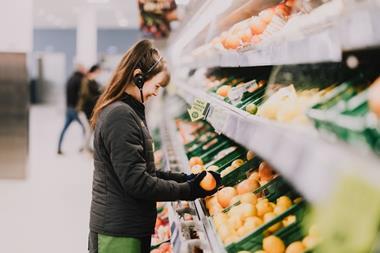
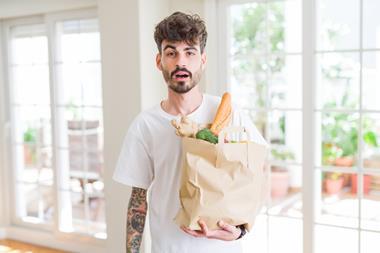
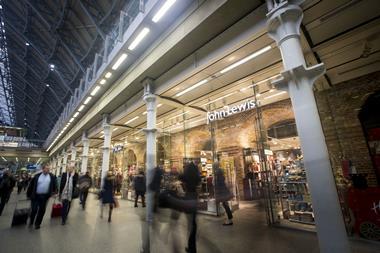

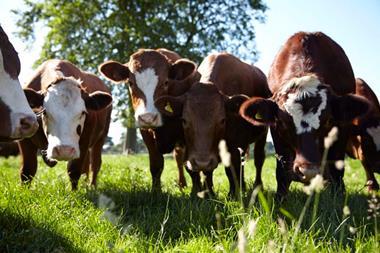
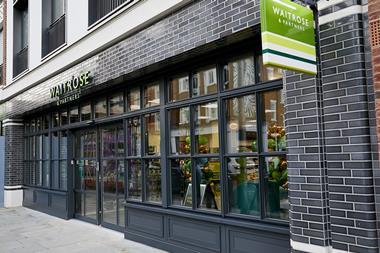






No comments yet